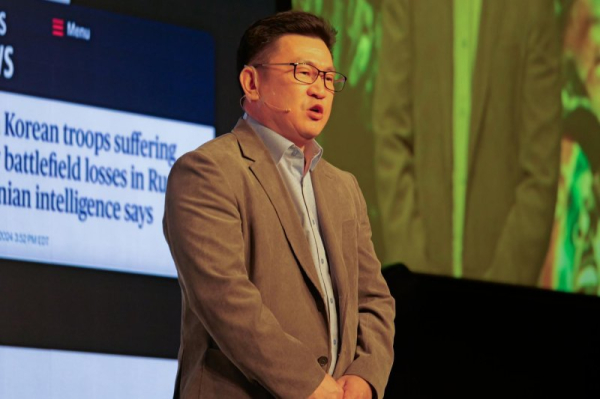

1 of 2 | Kim Kang, former deputy representative at the North Korean mission in Russia, on Wednesday called on international media and civic groups to speak out against the regime of Kim Jong Un. He was speaking publicly for the first time at the 2025 World Convention on North Korean Human Rights conference in Seoul. Photo by Thomas Maresca/UPI
North Korean defectors and experts urged the international community to step up pressure on Pyongyang over human rights abuses as a major conference on the issue opened in downtown Seoul on Wednesday.
At the 2025 World Convention on North Korean Human Rights, Kim Kang, former deputy representative at the North Korean mission in Russia, said global attention to rights must not fade amid renewed military tensions and the collapse of inter-Korean dialogue.
Speaking publicly for the first time since his 2016 defection, Kim said he fled after his aunt was arrested for secretly distributing Bibles and his family was branded guilty by association.
“It’s time we raise our voices and shed light on North Korea’s oppression,” he said. “Civil society and international journalists must criticize and pressure [North Korean leader] Kim Jong Un to change his flawed policies.”
Kim’s remarks reflected a growing call among defectors and activists for governments and international bodies to restore focus on human rights after years of military tensions and nuclear-centric diplomacy.
A 2014 U.N. Commission of Inquiry found that North Korea committed crimes against humanity — including torture, rape, execution, deliberate starvation and forced labor — that were “without parallel in the contemporary world.”
A report released last month by the U.N. Human Rights Office said Pyongyang has dramatically tightened controls over outside information, imposing punishments as severe as death for watching South Korean dramas or listening to foreign music.
That growing isolation underscored the testimony of Kim Yu-mi, another defector who said exposure to South Korean media was key to her family’s escape.
Growing up in a coastal military area near the inter-Korean border, Kim said she was able to pick up broadcasts from the South, which prompted her family’s dangerous 2023 defection by boat.
“Through South Korean broadcasts, we learned more about the outside world than most North Koreans,” she said. “We realized we were living in a prison without bars.”
Now an activist in Seoul, Kim called for expanding efforts to send radio, digital and printed materials into the North.
“If my family and I had never encountered outside information, we might still be living as slaves under a brutal regime,” she said.
The event, organized by the NGO Council for North Korean Human Rights and the New York-based Human Rights Foundation, includes sessions on technology, diaspora networks and youth advocacy. Organizers plan to issue a “Seoul Consensus” declaration on Thursday pledging to “act so that North Korean residents no longer live as isolated slaves.”
The conference comes amid renewed tensions on the Korean Peninsula. North Korea fired several short-range ballistic missiles on Wednesday morning — its first launch in five months — ahead of next week’s Asia-Pacific Economic Cooperation summit in Gyeongju.
At the same time, public engagement with the North appears to be fading. A survey released this week by the Korea Institute for National Unification found that fewer than half of South Koreans now view unification as necessary. Younger South Koreans, in particular, tend to see the North less as a future partner than as a distant, hostile state.
Against that backdrop, speakers at the conference said it was more important than ever to keep human rights at the forefront of regional and international policy debates.
“The 25 million people in North Korea are human beings whose voices are brutally silenced,” Kim Kang said. “The international community must raise its voice on their behalf.”